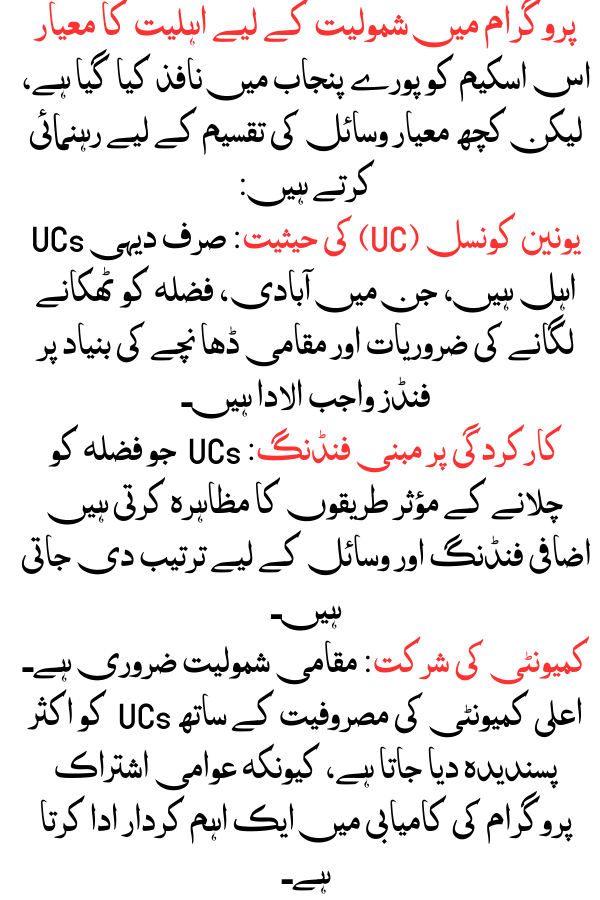Khadim-e-Punjab Saaf Dehat Programme
The Khadim-e-Punjab Saaf Dehat Programme (KPSDP) is a vital creativity launched by the Punjab government, aimed at addressing health and cleanliness issues in the rural areas of Punjab. This program underscores the government’s commitment to improving the standard of living for rural communities, ensuring that they have access to clean, hygienic settings. Under the leadership of the provincial government, KPSDP seeks to introduce waste management practices in villages across Punjab to prevent disease spread, improve environmental health, and enhance the quality of life for millions.
More Read :Registration Of Livestock Distribution Program Started
Introduction to Khadim-e-Punjab Saaf Dehat Programme
The Khadim-e-Punjab Saaf Dehat Scheme was first launched in 2017 by the Government of Punjab to address a critical need for hygiene in rural villages. Unlike urban areas where waste management systems are established, rural regions face many challenges in keeping clean environments. This program introduced structured waste collection and disposal systems at the Union Council (UC) level, empowering local councils to tackle waste increase and improve public health.
Objectives of the Program
The primary goals of the Khadim-e-Punjab Saaf Dehat Programme include:
- Improving Rural Sanitation: By starting routine waste collection, the program ensures rural areas are free from garbage, which helps prevent diseases caused by dirty conditions.
- Supporting Public Health: Cleanliness directly impacts health. Reducing waste reduces contact to pathogens, helping to lower the incidence of illnesses.
- Raising Awareness: Educating communities about the importance of preserving clean surroundings is a core objective of the program.
- Community Involvement: Attractive local residents is key, as it ensures the longevity and success of the initiative through collective responsibility.
More Read :A Complete Guide to the Collective Marriage Program in Pakistan
Eligibility Criteria for Program Involvement
The Scheme is realized across Punjab, but certain criteria guide the allocation of resources:
- Union Council (UC) Status: Only rural UCs are eligible, with funding owed based on population, waste disposal needs, and local structure.
- Performance-Based Funding: UCs that demonstrate effective waste running practices are arranged for additional funding and resources.
- Community Participation: Local involvement is essential; UCs with high community engagement are often given favorite, as public sharing plays a crucial role in the program’s success.
Funding and Resource Allocation
The Punjab government has allocated billions of rupees for this program. For example, in Sargodha district alone, Rs. 506 million were reserved, supporting nearly 185 UCs. The funds are distributed as follows:
- Union Council (UC) Support: Each UC typically receives around Rs. 2.5 million to implement waste management systems, while wards receive Rs. 500,000 for local projects.
- Waste Collection Vehicles and Equipment: Additional resources, including 230 vehicles and 702 sanitary workers, were mobilized in the early phases, predominantly to address urgent waste disposal needs.
More Read :1000 Super Seeder Project for Farmers by CM Punjab
Additional Funding Initiatives
In addition to the primary allocations, the program includes flexible funding for districts that perform well in meeting cleanliness targets. The government also explores additional budgets for technological integration, such as digitized waste monitoring systems, in high-performing areas.
Phased Rollout of the Khadim-e-Punjab Saaf Dehat Programme
The program is being rolled out in multiple phases to ensure efficiency and effectiveness:
- Initial Phase (2017): The Scheme’s first phase focused on identifying key areas for intervention, conducting awareness campaigns, and establishing initial dumping sites.
- Second Phase (2018): Expanded to cover more UCs, with enhanced focus on community awareness and better waste collection logistics.
- Ongoing Phases (2024): The program now emphasizes sustainable practices, such as community-led clean-ups, and continues to expand across Punjab.
Achievements and Success Stories
Since its launch, the Khadim-e-Punjab Saaf Dehat Scheme has achieved impressive results:
- Clearing Dumping Sites: Thousands of dumping sites have been cleared across Punjab. In Rawalpindi district alone, 2,662 sites in 98 UCs were cleaned in the initial phases.
- Improved Public Health: Residents report lower rates of illnesses related to poor health, such as digestive impurities, especially in areas where waste collection is regular.
- Enhanced Infrastructure: Hundreds of waste collection points with containers have been set up, with community contribution actively promoted to sustain these efforts.
More Read :CM Awards Cash Prizes, Scholarships
Case Study: Rawalpindi District
In Rawalpindi, the Scheme has been particularly successful. Over 803 garbage collection points were established across the district’s UCs, improving overall health levels. The project organized more than 700 sanitary workers and 230 vehicles, greatly enhancing waste disposal in the area.
Future Prospects and Expansion
The Khadim-e-Punjab Saaf Dehat Scheme is evolving with an pushy plan for statewide application. Key future goals include:
- Increasing Resource Allocation: More funds are expected to be distributed to districts that require additional support, especially in underserved UCs.
- Community Training and Education: Ongoing campaigns will focus on educating residents about hygiene and health practices.
- Technology Integration: The government is looking into digitized waste observing, which can help UCs track waste disposal patterns and improve resource share.
- Sustainable Waste Disposal Methods: The Scheme aims to introduce naturally friendly practices, such as recycling and composting, where feasible.
Conclusion
The Khadim-e-Punjab Saaf Dehat Scheme is a transformative creativity aimed at ensuring that Punjab’s rural areas are as clean and healthy as its urban centers. Through structured planning, wide resource allocation, and community involvement, the program has made important strides in addressing waste management challenges. For millions of people living in Punjab’s villages, the Khadim-e-Punjab Saaf Dehat Scheme represents a promising step towards a cleaner, healthier, and more imposing rural life.
More Read: Govt of Punjab E-Bike Scheme


